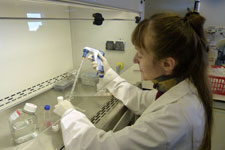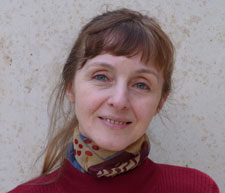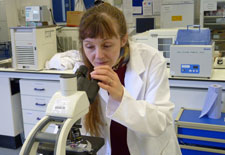Academic calls for universities to join forces to boost research
Posted Monday 28 May 2012
 Experts from different disciplines and universities should work together more closely to secure research grants, according to a senior academic at London's Kingston University. Professor Barbara Pierscionek, who recently took up the post of Associate Dean of Research and Enterprise at Kingston's Faculty of Science, Engineering and Computing, urged institutions to combine resources to increase research output.
Experts from different disciplines and universities should work together more closely to secure research grants, according to a senior academic at London's Kingston University. Professor Barbara Pierscionek, who recently took up the post of Associate Dean of Research and Enterprise at Kingston's Faculty of Science, Engineering and Computing, urged institutions to combine resources to increase research output.
"Times are tough and money is tight so we ought to be putting in grant applications involving larger groups of researchers who have a variety of skills," she said. "Competitiveness is good to a point, but I've worked in a number of universities and seen how counter-productive it can be if taken to extremes. It's time to foster a true spirit of collegiality across subject areas and universities."
Professor Pierscionek was attracted to the post at Kingston by the fact her new faculty includes disciplines as diverse as engineering, computing and life sciences. "I'm looking forward to setting up projects across all these subject areas to increase research activity even further," she said.
 Her own research is testament to the success of combining resources for a common end. It focuses on the eye and involves neurobiology, physics, mathematics and biochemistry. "To measure the refractive index and to simulate the muscles of the eye, for example, I needed instruments to be constructed which meant bringing my medical research fellowship into an engineering environment," she said. "Over the years I've also looked into the physical properties of the eye, which involved lens modelling and a move towards computer sciences. My research has depended on successful links with a number of specialist areas, so I understand just how important it is for academics to work closely across disciplines."
Her own research is testament to the success of combining resources for a common end. It focuses on the eye and involves neurobiology, physics, mathematics and biochemistry. "To measure the refractive index and to simulate the muscles of the eye, for example, I needed instruments to be constructed which meant bringing my medical research fellowship into an engineering environment," she said. "Over the years I've also looked into the physical properties of the eye, which involved lens modelling and a move towards computer sciences. My research has depended on successful links with a number of specialist areas, so I understand just how important it is for academics to work closely across disciplines."
After completing her first two biochemistry degrees in Australia, Professor Pierscionek became that country's youngest WD Wright National Health and Medical Research Council fellow. A move to Bradford University in the United Kingdom followed, before a shift to the University of Ulster in Belfast. There she headed the vision research group, where she diversified the portfolio to include work on proteomics, nanotechnology, optics, psychophysics, psychology and image analysis.
Professor Pierscionek also holds an MBA and a Masters in Law focusing on cyber crime. She has written a book about law and ethics for eye care practice and has a continuing interest in safer medicines and organ donation. She puts her varied experience down to allowing herself not to be defined by one subject area. "The fact that I spent seven years of my research life working in an engineering department as a life scientist means I have an affinity with engineers and computer scientists and can understand the languages of the different groups. I think that if you're open minded enough to work with different people you can quite quickly pick up links in interdisciplinary projects," she said.
 Professor Pierscionek describes herself as a facilitator, co-ordinator and someone who leads by example. "I get a real sense of satisfaction from seeing researchers pick up the germ of an idea and run with it," she said. "That's what science is supposed to be about."
Professor Pierscionek describes herself as a facilitator, co-ordinator and someone who leads by example. "I get a real sense of satisfaction from seeing researchers pick up the germ of an idea and run with it," she said. "That's what science is supposed to be about."
The Dean of Kingston University's Faculty of Science, Engineering and Computing, Professor Edith Sim, welcomed Professor Pierscionek's appointment. "Barbara's experience across engineering, instrumentation and biology makes her an ideal person for the role of Associate Dean of Research and Enterprise," she said. "She has an impressive profile in vision research and I am confident she will play a key role in building on our existing successes and boosting research activity even further within the faculty."
- Find out more about research at Kingston University.
Contact us
General enquiries:
Journalists only:
- Communications team
Tel: +44 (0)20 8417 3034
Email us



